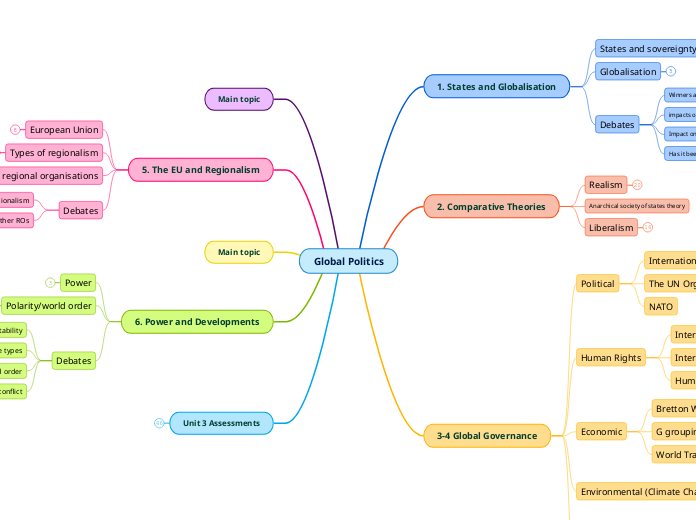a Wilcox Wilcox 1 éve
1089
Global Politics
The discourse encompasses various facets of global interactions and structures, focusing on the roles and influences of technology, economic frameworks, political entities, and environmental considerations.

a Wilcox Wilcox 1 éve
1089

Még több ilyen
Use comparative theories if you can
Covers two or more topics
forms of polarity
forms of governance
change over time
significance
main conclusion
3 analytical/evaluative sections
mini conclusion
against
for
intro - line of argument
Realist vs liberal view on e.g
conflict
world order
power
significance of states
human nature
Compulsory/no choice
Compare two e.g.
states (power)
impacts
causes
processes
concepts
institutions (governance)
effectiveness
features
Choice of two questions
Global significance and prospects
Integration
Security
Enlargement
Climate change
Human rights
Poverty reduction
Conflict resolution
Need for reform
Legitimacy
Impact of state power
Summits
Conventions
UN bodies
G20
G7
World Bank Group
International Monetary Fund
ECHR
International Criminal Court
Yugoslavia
Rwanda
Nuremburg
International Court of Justice
Economic & Social Council
General Assembly
Security Council
Locke
Mechanistic theory
Commonwealth & social contract
Rule of law
Rationalism & enlightened self interest
Fukuyama 'end of history'
liberal institutonalism
Keohane
interdependence liberalism
democratic peace theory
Kant 'perpetual peace'
Leviathan and order
Human nature
State of Nature
Human nature & structure
Huntington 'clash of civilisations'
Anarchic state system
Offensive
Mearsheimer
Defensive
Waltz
Power/human nature
Morgenthau
Hobbes
Machiavelli
Thucydides
Political (Global Governance)
Cultural
Economic